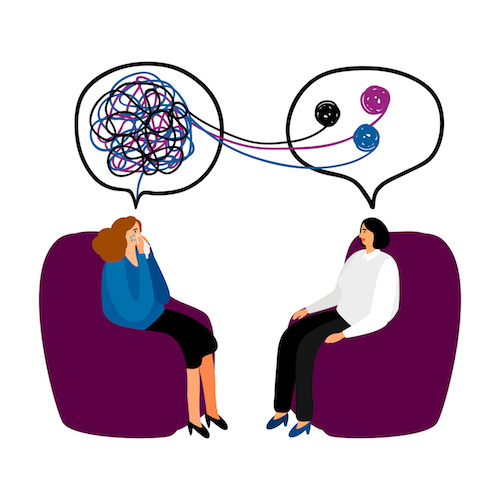Are you someone who repeats words or phrases over and over again, even if they don’t make sense? Do you feel compelled to do so, despite knowing that it’s not logical? If yes, then you might be suffering from Palilalia OCD. This type of OCD is one of the lesser-known forms but can have a significant impact on your daily life. In this blog post, we’ll explore what Palilalia OCD is all about and how it affects people who suffer from it. So grab a cup of coffee and read on to learn more!
Contents
What is Palilalia OCD?

Palilalia OCD is a type of OCD in which the person experiences repetitive speech. This can include repeating words or phrases, saying the same thing over and over again, or even speaking in a monotone voice. People with Palilalia OCD often feel like they can’t control their speech, and it can be very distressing for them.
This type of OCD is also known as ‘palilalia disorder’. It is not yet fully understood, but it is thought to be related to anxiety and an inability to control one’s speech. People with Palilalia OCD often experience feelings of shame or embarrassment due to their repetitive speech patterns and may even feel like they are going crazy.
Symptoms of Palilalia OCD
There are many different symptoms of Palilalia OCD, and they can vary from person to person. Some common symptoms include:
- Compulsively repeating words or phrases out loud or in one’s head: When someone with Palilalia OCD engages in this behavior, they can become stuck repeating the same words or phrases over and over again.
- Compulsive counting or listing: People with Palilalia OCD may count objects or items, list things in categories, or repeat numbers for no apparent reason. It is not uncommon for someone to count the days of the week or months of the year, as well.
- Avoidance: People with Palilalia OCD may avoid situations that trigger their compulsive behavior, such as social settings or places where people might notice or comment on their behavior.
- Rituals: Palilalia OCD often comes with rituals and behaviors that are repeated, such as touching a certain object three times before speaking, or taking a certain route home.
- Intrusive thoughts: People with Palilalia OCD may have intrusive thoughts and worries about speaking in public or not being able to control their compulsive behavior.
- Anxiety: Anxiety is often accompanied by Palilalia OCD, and can range from mild to severe.
- Depression: People with Palilalia OCD may experience feelings of hopelessness, loneliness, or sadness due to their condition.
These symptoms can be very disruptive in day-to-day life, making it difficult for someone to focus on tasks or interact with others.
Causes of It

There are many possible causes of palilalia OCD, but the most likely cause is a combination of genetic and environmental factors.
Some of these causes are:
Genetics
One of the most common causes of Palilalia OCD is genetics. If a person has a close relative who also has OCD, they may be at an increased risk of developing the disorder as well.
Stressful life events
Experiencing stressful life events or trauma can trigger Palilalia OCD in some people. This could include anything from losing a job to being in an abusive relationship, to a major life change such as moving.
Brain chemistry
Imbalances in the brain’s neurotransmitters, such as serotonin and dopamine, can also lead to Palilalia OCD. This can happen due to certain medications or medical conditions, or simply from the body not producing enough of these chemicals naturally.
Diagnosing Palilalia OCD
There are a few different ways that doctors can diagnose palilalia OCD. One way is through a physical examination. This will help to rule out any other medical conditions that could be causing the repetitive speech. The doctor will also ask about your symptoms and how long you have been experiencing them.
Another way to diagnose palilalia OCD is through psychological testing. This can help to identify any underlying mental health conditions that may be contributing to the disorder. The doctor may also ask you to keep a journal of your symptoms and their triggers. This can help find patterns in your behavior.
The diagnosis also relies on the patient’s willingness, to be honest about their symptoms and experiences. Those who are diagnosed with palilalia OCD must understand that it is a real disorder, and not just something they can “snap out of”.
Treating Palilalia OCD

If you or someone you know is struggling with Palilalia OCD, it is important to seek professional help. Palilalia OCD can be treated with a combination of medication and therapy.
Medication
One of the most common medications prescribed to treat Palilalia OCD is Selective Serotonin Reuptake Inhibitors (SSRIs). SSRIs work by blocking the reabsorption of serotonin in the brain, which can help to reduce anxiety and decrease compulsive behavior.
These medications also help to balance out the neurotransmitters in the brain, which can reduce palilalia OCD symptoms.
Therapy
These are some types of therapy:
Cognitive Behavioral Therapy (CBT)
Cognitive Behavioral Therapy (CBT) is a type of therapy that can help those with Palilalia OCD to manage their symptoms. CBT works by helping people identify and change any negative thoughts or behaviors that could be contributing to the disorder.
The therapist can also help patients create healthy coping strategies for dealing with their Palilalia OCD symptoms and triggers. Additionally, therapy can be very beneficial in helping those with Palilalia OCD understand their condition and learn how to make positive changes in their life.
Dialectic Behavioral Therapy (DBT)
Dialectic Behavioral Therapy (DBT) is another type of therapy that can be used to treat Palilalia OCD. This type of therapy focuses on teaching people how to manage their emotions and cope with difficult situations. The therapist will help the patient identify and challenge any negative thoughts or behaviors that could be contributing to their Palilalia OCD symptoms.
Additionally, DBT can help those with the disorder learn new skills that can help them healthily cope with stress and anxiety. This type of therapy is very effective for treating Palilalia OCD.
Acupuncture
Acupuncture is an alternative and holistic treatment for Palilalia OCD. This type of treatment focuses on stimulating certain points in the body with tiny needles. Acupuncture can help to reduce stress, anxiety, and depression – all of which are common symptoms of Palilalia OCD. Additionally, it can help to balance out the neurotransmitters in the brain, which can help to reduce symptoms of Palilalia OCD.
Support Groups
Those diagnosed with Palilalia OCD need to know that they are not alone. Joining a support group can be a great way for individuals to find understanding and comfort in knowing that others are going through something similar.
Support groups can also provide helpful resources and tips for dealing with Palilalia OCD, as well as offer an outlet for people to share their experiences in a safe and supportive environment.
Living with It

If you live with Palilalia OCD, you know that this disorder can be extremely debilitating. You may feel like you can’t leave your house or even take a shower without having to say the same thing over and over again. This can make it difficult to work, socialize, and even take care of yourself. Thankfully, there are treatments available that can help you manage your OCD and live a more normal life.
Some ways to manage Palilalia’s OCD include:
Mindfulness
One of the best treatments for Palilalia OCD is mindfulness. This practice helps to center your thoughts and bring awareness to what you are thinking, feeling, and doing at any given moment. Mindfulness can help you become aware when obsessive thoughts about repeating words or phrases come up and learn how to calmly redirect your focus without giving in to compulsions.
Exercises
An essential part of Palilalia’s OCD treatment is physical exercise. Exercise helps reduce stress and improves your overall mental health. Participating in activities such as running, swimming, biking or yoga can help you manage your symptoms and lead a healthier lifestyle.
Food
An important part of managing Palilalia’s OCD is to maintain a healthy diet. Eating nutritious foods helps balance your moods and can make it easier to manage your symptoms. Eating plenty of fruits, vegetables, whole grains, and lean proteins can help give you the nutrients you need while also providing enough energy throughout the day.
Rest
Some people with Palilalia OCD also benefit from more rest. Making sure you get enough sleep each day can help reduce stress and make your symptoms easier to manage. Aim for at least eight hours of sleep per night and avoid late-night activities that can interfere with getting a good night’s rest.
Conclusion
Palilalia OCD can have a profound effect on one’s life if not addressed properly. Fortunately, with the right treatment and therapeutic approaches, individuals suffering from palilalia OCD can find relief and improved quality of life. If you experience any of the symptoms discussed above, it is important to talk to your doctor or mental health professional about getting help. With the right guidance and support, you can find ways to manage this condition so that you live a healthy and fulfilling life.
For more information and guidance, please contact MantraCare. OCD is a mental health disorder characterized by obsessions and compulsions. If you have any queries regarding Online OCD Counseling experienced therapists at MantraCare can help: Book a trial OCD therapy session


